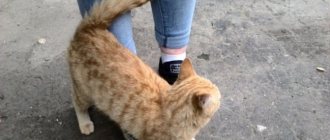Why are they doing this?
I wonder why and why cats persistently climb into people’s beds? After all, loving owners buy special houses for them, mats, bedding, and even hammocks. In the end, there is always a place on the rug, under a warm radiator.
The reasons for this behavior of mustachioed striped animals are not always obvious, and can be both completely scientifically based and based on esotericism and myths.
Beware of cat hair
Even if you are not allergic to cat fur, your body may react to branches, debris, or germs that your cat drags into the house.
Also keep in mind that the cat is your business item, made in a scattered box, and you can accidentally give it away in the house.
The Asthma and Allergy Foundation in the US found that up to 30% of the American population has developed allergies to animal hair. If this is the case for you and you still want to keep your cat in bed, there are air filters that can help you.
Our Reading Tip: Cat Allergies: How to Use Bypasses
Objective reasons
Cats are very smart and practical creatures; for any of their behavior, even very strange ones, there is almost always a reasonable explanation.
Cats love sleeping with people because:
- It's warm to be next to a person! These animals love warmth, and, for example, the radiator may be too hot.
- Cunning and rather selfish creatures understand that a person chooses the best places in his home. This means they are trying with all their might to get there.
- Children's, long-forgotten feelings of mother's closeness, safety and warmth. Well, you can really understand the cats here!
- The simplest explanation: cats feel calm next to their beloved owner!
How to stop a cat from sleeping on the bed?
How to stop a cat from sleeping on the bed? If a cat is used to sleeping on the owner's bed, then it is difficult to wean it off. Many owners punish and scold, but everything is useless. How to stop a cat from sleeping on the bed? Some tips:
- The best remedy is to not allow her to sleep in the bed from a very early age. At this time, the cat can be punished, explaining that this cannot be done.
- Give your cat a new sleeping place. Perhaps she goes to bed because she does not have her own place to sleep. Buy a special basket, a soft pillow and a bed.
- Spray the animal with water from a spray bottle.
- Place double-sided tape on the bed. The cat will jump and its paws will stick to the tape - this will give it the courage to do it.
- Scold your cat even before she wants to jump on the bed . But, if the animal does end up on your bed, continue to swear at it until it leaves. This way the cat will get used to not being allowed to jump into this place.
There are many different opinions about the habits of “mustachioed psychics.” Some say that a cat only lies down in a place with negative energy, while others are sure that a cat will not lie down in a bad place. There is even a belief that where the cat most often sits in the house, that’s where the bed should be placed. Each person chooses for himself what to believe in and what not. But we can definitely say that without fluffy and mustachioed pets our home will be empty and uncomfortable.
Esoterics and bioenergy
Almost from the moment of domestication, cats are endowed with mystical abilities: the ancient Egyptians worshiped them as gods; in the fairy tales of the Slavic peoples there is the Bayun Cat, kind and wise.
In fairy tales and myths of different nations, cats occupy an important place. Perhaps this is not without reason:
- Cats sense unfavorable energy structures and intersection points of biofields. In an effort to normalize them, they fit into the very center of such places.
- These animals are able to identify painful and problematic places in the human body and even treat them to the best of their ability, lying next to or on the person.
Why do cats like to sleep on a person, on a person’s head?
Why do cats like to sleep on a person, on a person’s head? All the actions of a cat have their own mysterious meaning for humans, but important for the animal. The owner carefully observes the behavior of his pet, and cat owners often wonder: why do cats like to sleep on a person, on a person’s head? A few explanations:
- Dominance over a person, the desire to show devotion and humility . Don't believe those who say that if a cat sleeps on a person's head, then there is nothing good about it. The cat will be offended if the owner does not respond in kind to her affection, but drives the animal away. Even if the cat interferes during sleep, you need to change his resting place with caution and very carefully.
- Energy factor. Everyone knows that cats have a great sense of what cannot be seen with their eyes. If an animal sits on its head while a person is sleeping, then you need to listen to yourself. Perhaps you need a good rest, because the cat senses when a person is tired and helps him gain energy and get rid of headaches.
- From the point of view of science , which does not have a place for energy and other similar things, there is a simple explanation for the question of why a cat sleeps near or on a person. It's all about the same warmth that a cat loves. Temperature is of great importance. If it’s hot near the radiator, then the human body is the ideal temperature for a cat.
As mentioned above, an unhealthy organ has an elevated temperature, and therefore the cat easily finds it. If the person is completely healthy, then the cat settles where it is comfortable.
Reasons for the ban
Cats should not sleep next to humans for several reasons. And there is no place for myths and emotions, only “naked” medical contraindications:
- People who are prone to allergies should absolutely not take cats into bed with them, even if there is no reaction to the pet yet. The key word here is “yet.” If the pet owner suffers from hay fever, an allergy to household dust, or asthma, then anything can provoke an exacerbation, including secretions from the cat’s glands.
- Cats should not be allowed to sleep with small children, old people or seriously ill people. There are cases where people suffocated under the weight of a cat's body.
- Do not forget that cats are carriers of dangerous diseases and parasites. If there is even the slightest suspicion that your cat has a disease, you should not take it to bed!
What a cat should not be allowed to do in the owner's bedroom
No matter how the owner pampers his pet, he should know that the bed is a place for a person and his stay in it is no more than a sign of the owner’s generosity, therefore:
- Under no circumstances should you allow your pet to play in bed. If, with the onset of darkness, he jumps on you and begins to provoke you into playing, then you need to stop this immediately. The animal must know that the bed is a place to sleep.
- You should not allow your pet to wake you up in the middle of the night or early in the morning.
- The cat should know that the house is the main owner, you shouldn’t spoil him with or without reason. Under no circumstances should you get up at night at your pet’s first impulse and go feed him.
A cat is an animal that always acts on its own, but if it feels sincere affection for its owner, then it can be persuaded to sleep in the same bed. Moreover, this will bring pleasure not only to humans, but also to animals.
What threatens the neighborhood?
Cats, especially those kept in free-ranging conditions and without vaccinations and proper care, pose a real danger to human health. They can give their owners very unpleasant “gifts”:
- Ringworm. The disease is highly contagious and requires very long treatment.
- Toxoplasmosis. It is extremely dangerous for pregnant women, as it causes irreversible damage to the development of the fetus. It is worth noting that most people who have contact with cats suffered from this disease in childhood and have antibodies to its causative agent, but when planning a pregnancy, it is better to undergo the appropriate tests.
- Pasteurellosis is a serious infectious disease.
- Various types of fungal diseases.
- Worms.
Even if the cat is domestic, you need to pay enough attention to it, get vaccinated and contact a veterinarian if:
- The animal suddenly began to lose hair
- A rash has appeared
- The cat started sneezing and had a fever
- A lot of dirt has accumulated in the animal's ears
- There is discharge from the eyes
- Diarrhea and/or vomiting began.
Love your pets and be healthy!
Why do cats sleep in place or on their owner's things?
Why do cats sleep in place or on their owner's things? Cats are one of a kind - unique and inimitable. They are difficult and not as good-natured as other pets. Therefore, every act of a cat can be explained. Why do cats sleep in place or on their owner's things?
- Our clothes store body odor. The cat wants to appropriate it for himself in order to be closer to the owner and have a close relationship with him. The cat quickly masters the new territory, and then it considers it its own. She also needs to make her owner's things her own. By this she shows that she trusts her owner and shares her cat life with him.
- Our clothes retain the smell. Cats climb on things to feel safe. She feels as if she is sitting on her owner's lap.
- From an esoteric point of view, this fact can be explained by the fact that the cat loves to collect bad energy. The animal lies on clothes, collecting negative energy waves that have accumulated on things during the working day from stress or bad thoughts.
Tip: If a cat is lying on your things, do not shoo it away abruptly. Give her time, and if clothes are needed, kick out the cat, who is showing his love for you in this way.
Tips from Jackson Galaxy
To figure it out, let's follow the advice of the famous cat behaviorist Jackson Galaxy, whom you may have seen in the My cat from hell program on the Animal Planet channel.
Tip #1: Don't act rashly
To begin with, what NOT to do under any circumstances:
- Scold, chase, splash water. Even if your nerves are at their limit, this is prohibited. You should never beat an animal under any circumstances - I hope you understand this.
- Feed in the middle of the night.
- Lock the animal in another room. Cats are territorial animals and do not tolerate confined spaces. Systematically locking an animal in a small space such as a bathroom and leaving the animal alone will deprive it of self-confidence, frighten it, and may provoke behavioral problems: the animal may become aggressive or begin to mark its territory. So no cat jail!
Tip #2: Adjust your diet
Jackson advises feeding your cat 3 times a day, spacing meals no more than 6-8 hours apart. This is easy to do for those who are constantly at home, but for those who are at work all day, certain difficulties arise. If you leave your cat dry food for the day, then do not fill the bowl with half the daily amount or less, so that when you arrive the animal is slightly hungry and is waiting for food.
In order for your cat to go to bed with you, the last meal should be an hour and a half before bedtime. For example, if you go to bed at 11 pm, your cat should eat at 9:30. But there is another very important point, more details in the next tip.
Tip #3: Hunt, catch, kill, eat
Track, catch, kill and eat - this is the sequence in which hunting occurs. That is why it is very important to force the cat to spend a lot of energy before eating - through active games.
Never play with the animal with your hands, so that it does not begin to perceive your flesh as a toy. Modern pet stores have a huge assortment of toys - fishing rods and swings, various balls and mice, or you can not spend money and make toys yourself.
Indeed, there is a kind of “sublimation” - the replacement of hunting with game. My cat, after active body movements, tightly grabs the toy, carries it to the place where the bowl is, puts it next to it and starts dinner. It's pretty funny.
Well, after eating, the cat starts grooming - it washes itself thoroughly and finally goes to rest.
Options for night and morning activity of cats
It is not only the need for physical activity that encourages cats to get their owners up at night and in the morning. There are other reasons that make a pet behave this way. Often in these ways animals declare:
- inability to control the territory;
- desire to communicate;
- any problems.
For a cat, a house or apartment is its personal territory, which must always be under control. She should have free access to the entire space. The cat periodically walks around the home to make sure that there are no foreign odors and no danger. If the door in one of the rooms is closed, this causes anxiety in the pet; he is not sure of the safety of the territory. There is no need to be surprised that in the middle of the night shouts are heard demanding that the obstacle be removed for inspection.
Cats are smart animals, they understand that a person is a strange, inexplicable creature with whom they need to play a game according to certain rules. At night or early in the morning, the cat wakes up the owner and leads him to the door or refrigerator. The owner, in turn, tries to release or feed the pet, to fulfill its desire, but it refuses. It seems that the animal is behaving stupidly and does not know what it wants. In fact, the cat is just bored, she wants communication, but understands that attention can only be attracted in such ways, and she gets her way.
Your pet's anxiety may be related to illness. If he suddenly wakes you up by meowing, perhaps the cat is in pain and is trying to tell you about his problem. If any signs of illness appear, the animal should be taken to the veterinarian. You should know that cats do not sleep well in a new place; after moving, it will take some time to develop the territory. Owners also experience restless nights when their pet begins to go into heat.
Common mistakes: what not to do?
It is important for the owner to remember that the animal should never be taken out of the house during daytime rest and night sleep. Young children should be prohibited from doing this, since such an act can forever push the cat away from his favorite place. You need to call and wait until the animal leaves the house on its own.
If the kitten cries and wants to leave the litter and lie down with the owner, you should bring him back, stay with him and wait until he falls asleep. It is impossible to teach a baby to sleep in the master’s bed, because it is difficult to wean him from this habit in adulthood. With patience and love, you can accustom your mustachioed pet to its own corner without unnecessary stress.
Potential dangers of having a cat in the owner's bed
Do not forget about the dangers of sleeping together with a cat
- Cats that roam freely on the street can be carriers of diseases that are dangerous to humans.
- Timely vaccination prevents infectious diseases, but does not provide a 100% guarantee.
- There are feline diseases that are dangerous for pregnant women and children (toxoplasmosis), for which they are not vaccinated.
- A pet that considers the bed to be its own territory will mark it.
To help pet owners - a convenient and free Petstory service
Online consultations with the best veterinarians, making an appointment, quickly searching for the nearest veterinary clinic or pet store, a lot of useful information about the breeds of pets, about the proper upbringing, care, maintenance, treatment of pets - all this will be at your fingertips with Petstory.
Download the specialized application for pet owners Petstory on the IOS and Android platforms using the link – https://petstory.ru/prilozhenie-konsultacija-veterinar/.
Sources:
https://koshkamurka.ru/4965-priuchenie-kotyonka-k-mestu-dlya-sna.html https://murkoshka.ru/povedenie/kak-priuchit-koshku-k-domiku.html https://www. poznavayka.org/zoologiya/train-kitten-to-place-for-sleep/
Reasons for cat activity at night and in the morning
The owners sleep peacefully at night, early in the morning, and the cat decided to play. He jumps on the curtains, climbing up to the cornice, turning over flower pots, fiercely sharpening his claws on the door of a polished cabinet, enthusiastically tearing a plastic bag, chasing a found ball throughout the apartment. From time to time he jumps on the bed and begins hunting for the hands and feet of his owners. It is quite difficult to withstand such tests when you really want to sleep. The situation becomes unbearable if there is a small child in the house, who will take a long time to put to bed after such a wake-up call.
Before looking for ways to deal with the problem, you need to understand the reasons for this cat’s behavior. There are two of them:
- natural instincts;
- schedule.
By nature, cats are nocturnal predators. In the wild, they hunt in the dark, when their main enemies are fast asleep. It is not surprising that many cats are more active at night than during the day - this is their physiological feature.
Most pets are completely alone during the day. The owners go to work and school in the morning, and the apartment is empty. The cat gets bored and goes to rest. Until the evening she manages to sleep well, so at night she does not have such a desire. To maintain health, the animal needs physical activity. Therefore, during a short period of wakefulness, increased activity is observed. We must not forget that the cat needs communication. If he is alone at home all day, the desire to compensate for the lack of attention at night is understandable. It's not your pet's fault that you feel sleepy at this time.











